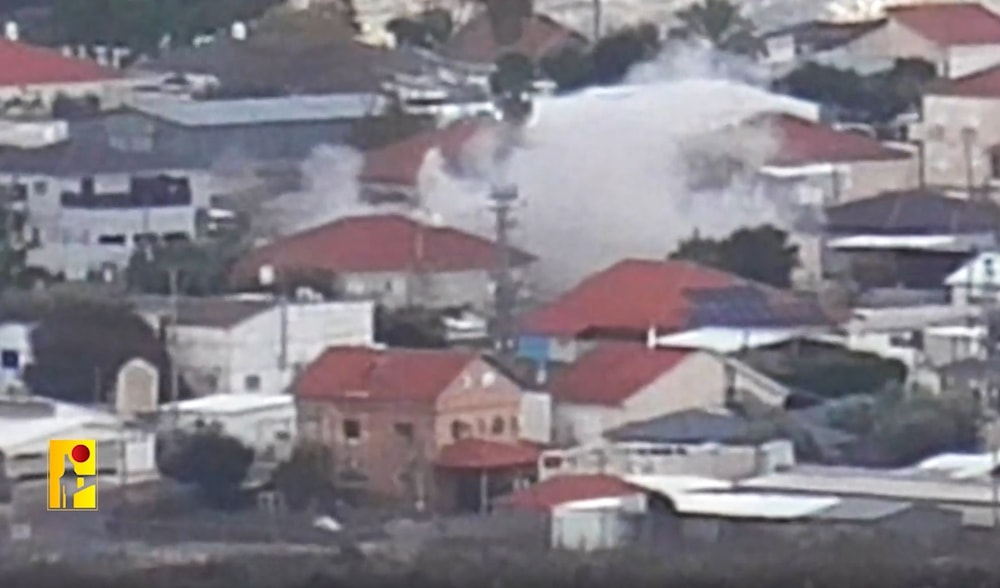Israeli settlers in north, abroad won't return due to lack of security
Surveys and interviews with Israeli settlers who have fled the occupied territory provide a deep insight into the effectiveness of the Resistance's operation in dismantling the colonial project.
-

Smoke billows from the "Avivim" settlement in Israeli-occupied Lebanese territories following an anti-tank missile strike fired by Hezbollah fighters, on December 24, 2023. (Islamic Resistance in Lebanon/Military Media)
An Israeli settler who recruited others to colonize the occupied Lebanese town of al-Malikiyah has said that "no one is protecting" her and other settlers, doubting whether she would return when the war ends.
Sivan Shoshani Partush and other Israeli settlers lived in Kibbutz "Malkiya", over usurped Lebanese territories, where they built and expanded the colonial settlement, just 200 meters away from the line of Israeli withdrawal from Lebanon.
"There was fear, but I got over it, because that’s the choice I made, because someone was protecting me," Partush told the Associated Press. "But now there’s a feeling that no one is protecting us," she admitted. Her statement comes after Israeli colonial outposts were outrun by Palestinian Resistance fighters on October 7 and as the Islamic Resistance in Lebanon - Hezbollah continues to target Israeli occupation sites across the Lebanese-Palestinian border, undeterred by the Israeli aggression.
Tens of thousands of Israeli settlers were evacuated from settlements and farms across the Northern Front and relocated to settlement cities and other kibbutzim across occupied Palestine.
"They need to create a security belt, we need to have an Israeli army presence always, and they need to strengthen the emergency squads so not even a mouse can pass through the border," she said.
"We want to go home, but on the other hand, where will we go? It’s very scary," she explained.
"I don’t want my daughters to grow up like I did," said Michal Nidam another settler from "Kiryat Shmona", one of the largest settlements in the occupied al-Jalil, bordering Lebanon.
"I have had anxiety since I was little... I slept with shoes and clothes on," Nidam said.
Read more: With Radwan Force on border, we are 'sitting ducks': Israeli mayor
Fleeing Israelis abroad do not intend to return
As for Israelis who fled occupied Palestine, the Israel War Room website reported that the Israeli Committee for Immigration, Absorption, and Diaspora Affairs held a session today, Tuesday, to discuss their situation after the events of October 7, 2023.
This discussion comes against the backdrop of an emergency online survey conducted on the experiences of Israelis abroad after October 7.
1,713 respondents took the survey. 96% are Israelis living outside occupied Palestine, 55% of whom lived abroad for more than 10 years while 19% lived abroad for more than 5 years.
80% of respondents said they do not intend to return to "Israel", despite feeling unsafe in the countries they are residing in, whereas 70% reported that they changed their public behavior following October 7, in the sense that fewer people are displaying Jewish symbols, while others are speaking less Hebrew, going out for entertainment less often, and attending fewer meetings in city centers.
44% of respondents answered "yes" when asked if they had considered ways to enhance their "self-defense", with purchasing weapons, carrying tear and pepper gas, installing safety cameras in their homes, and enrolling in a personal defense course being the top options.
Chairman of the Immigration, Absorption and Diaspora Committee, Member of Knesset Oded Forer, said at the session that "Israel" must take appropriate measures to eliminate anti-Semitism across the world, considering that there is currently no official program that deals with Israeli communities abroad.
Read more: The spoils of Operation Al-Aqsa Flood on display in Gaza's streets

 4 Min Read
4 Min Read










